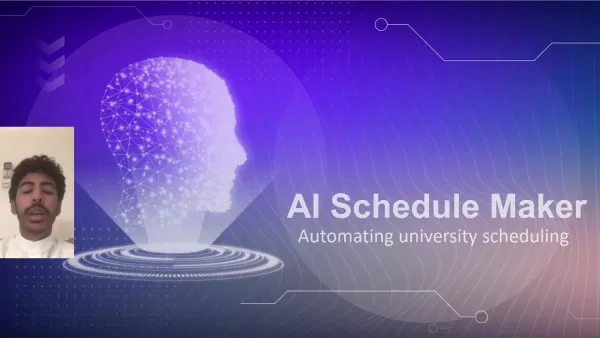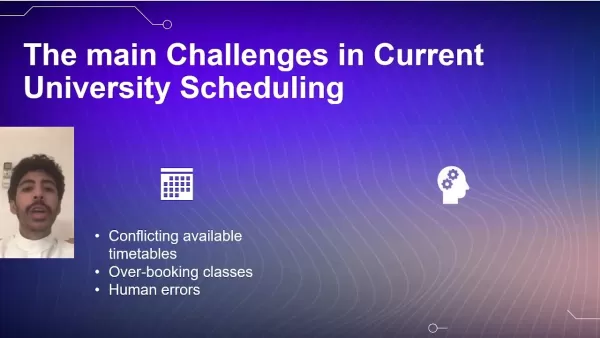AI-Powered University Scheduling: Streamlining Academic Timetables
In today's dynamic academic landscape, effective scheduling is vital for success. The AI Schedule Maker, designed for King Abdulaziz University, automates university timetables, addressing issues like overlapping classes and administrative inefficiencies. By delivering tailored, conflict-free schedules, it enhances the experience for both students and faculty.
Key Highlights
Traditional university scheduling systems often struggle with overlapping timetables and administrative overload.
AI Schedule Maker crafts personalized schedules by analyzing student and faculty routines.
Optimized resource allocation maximizes the use of university facilities.
Conflict-free schedules streamline classes, exams, and assignments.
AI minimizes human errors and reduces administrative workload.
The rollout plan includes system integration, data gathering, pilot testing, and full implementation.
Key challenges, such as system integration and user adoption, are proactively addressed.
Challenges of Current University Scheduling
Outdated Systems and Their Issues
Many universities, including King Abdulaziz University, rely on outdated scheduling systems that create significant administrative challenges. These systems often complicate online processes for students.

From website crashes due to high traffic to clunky user interfaces, the obstacles are numerous. Students are often forced to seek in-person help from the Deanship of Student Affairs, adding pressure to administrative staff.
Common problems with current systems include:
- Overlapping Timetables: Students face course conflicts, making it difficult to build workable schedules.
- Overbooked Classes: High demand and limited seats leave students unable to enroll.
- Human Errors: Manual processes lead to mistakes, causing delays and frustration.
- Administrative Overload: Handling scheduling issues increases staff workload, reducing efficiency.
- Inefficient Processes: Outdated interfaces and complex workflows create inconveniences for students and faculty.
Administrative Overload and Website Challenges
At King Abdulaziz University, online scheduling systems often falter under heavy traffic, particularly during peak enrollment periods. This makes accessing and managing course schedules difficult. Outdated user interfaces further complicate navigation and adjustments, pushing students to seek in-person support from administrative staff, which perpetuates a cycle of inefficiency.
This reliance on manual intervention is time-consuming and resource-intensive. Staff spend excessive hours addressing issues that could be automated, diverting focus from other critical tasks.
Key Issues:
- Outdated Interfaces: Poorly designed systems frustrate users.
- Website Overload: High traffic during enrollment causes system failures.
AI Schedule Maker: A Transformative Solution
Revolutionizing Scheduling with AI
The AI Schedule Maker redefines university scheduling by harnessing artificial intelligence to create efficient, user-friendly workflows at King Abdulaziz University. It automates and optimizes the scheduling process, reducing errors, easing administrative burdens, and boosting overall efficiency.

By analyzing student and faculty routines, the system makes informed scheduling decisions to deliver optimal timetables.
With three core features, AI Schedule Maker tackles common scheduling issues, ensuring seamless timetables.
Key Benefits:
- Fewer errors in scheduling.
- Customized schedules for students.
- Simplified management of complex scenarios.
By adopting AI Schedule Maker, King Abdulaziz University can transform its scheduling process into a streamlined system that supports academic success for students and faculty.
Core Features of AI Schedule Maker
The AI Schedule Maker includes three primary features to address the limitations of existing systems:
- Personalized Scheduling: The AI analyzes individual student and faculty routines to create tailored schedules that reflect their preferences and needs.

This approach ensures conflict-free schedules that align with users’ lifestyles, fostering better academic performance and work-life balance.
- Efficient Resource Allocation: The system optimizes classroom usage, faculty assignments, and timing to maximize university resources. It identifies patterns and opportunities for improvement through data analysis.
- Conflict-Free Timetables: The AI eliminates scheduling conflicts for classes, exams, and assignments, providing clear and manageable schedules for students and faculty.
These features create a productive and stress-free academic environment, benefiting both students and faculty while enhancing the overall experience at King Abdulaziz University.
Why AI for University Scheduling?
AI-driven scheduling offers unmatched efficiency compared to traditional software. Here’s why it stands out:
- Error Reduction: AI significantly reduces scheduling errors compared to manual processes.
- Personalization: Tailored schedules improve student satisfaction and academic outcomes.
- Complex Scenario Management: AI handles intricate scheduling needs with ease, adapting to various constraints.
Unlike static traditional systems, AI adapts to changing conditions, learning from data to optimize outcomes, making it more responsive to the university’s dynamic needs.
Implementation Plan and Key Considerations
The rollout of AI Schedule Maker at King Abdulaziz University follows a structured approach for a smooth transition:
- System Integration: Assessing university needs, including class sizes, room availability, and faculty preferences, while ensuring compatibility with existing systems.

This phase focuses on seamless integration with current infrastructure.
- Data Collection: Building a robust data strategy to ensure high-quality, reliable data for AI training.
- Pilot Testing: Trialing the system with a small group to evaluate feasibility, duration, and cost-effectiveness.
- Full Deployment: Rolling out the system across the Faculty of Computing and Information Technology after successful testing.
Key Considerations:
- Data Privacy: Secure handling of student and faculty information.
- System Integration: Ensuring compatibility with existing university systems.
- User Adoption: Providing training and support for a smooth transition.
By addressing these factors, King Abdulaziz University can ensure the successful adoption and long-term success of AI Schedule Maker.
How AI Schedule Maker Enhances University Scheduling
A Seamless Scheduling Process
AI Schedule Maker improves every stage of the scheduling process, delivering a streamlined experience.
- Personalized Needs Assessment: The system creates detailed profiles for students, factoring in course requirements, preferred timings, and extracurricular activities.
- Automated Schedule Generation: The AI scans course catalogs and available slots to generate conflict-free schedules tailored to each student’s profile.
- Faculty Preferences Integration: The system aligns faculty schedules with their teaching and research commitments.
- Resource Optimization: Classrooms are allocated strategically based on enrollment, ensuring efficient use of facilities.
- Conflict Resolution: The AI instantly identifies and resolves scheduling conflicts, offering optimal alternatives.
- Dynamic Adjustments: The system continuously monitors and adjusts schedules to accommodate changes in enrollment or unforeseen events.
- Seamless Communication: Automated reminders and notifications keep students and faculty informed of schedule changes.
Cost-Effectiveness of AI Schedule Maker
Long-Term Financial Gains
While implementing AI Schedule Maker requires an initial investment, the long-term savings are substantial, driven by:
- Lower administrative overhead.
- Optimized use of university resources.
- Higher student retention through improved experiences.
Additionally, adopting this system positions King Abdulaziz University as a forward-thinking institution, enhancing its reputation for leveraging technology to improve education.
Pros and Cons
Pros
Enhanced scheduling efficiency.
Customized timetables for students.
Reduced administrative workload.
Optimized resource allocation.
Improved user experience.
Fewer scheduling conflicts.
Cons
Initial implementation costs.
Data integration challenges.
Potential user resistance.
Reliance on high-quality data.
Use Cases
Optimizing University Operations
AI Schedule Maker supports:
- Personalized Student Scheduling: Creates tailored schedules to reduce conflicts and boost academic success.
- Faculty Resource Management: Optimizes teaching loads and preferences for efficiency.
- Event Scheduling: Manages workshops, seminars, and conferences to maximize space usage.
- Real-Time Adjustments: Adapts to changes in enrollment, faculty availability, or unexpected events.
Frequently Asked Questions
How does AI Schedule Maker personalize schedules?
The system analyzes students’ academic needs, preferred timings, and extracurricular activities to create tailored, conflict-free schedules that align with their lifestyles, enhancing academic performance.
What are the key benefits of AI Schedule Maker at King Abdulaziz University?
The system reduces administrative workloads, optimizes resources, and improves satisfaction for students and faculty. It minimizes conflicts, enhances classroom usage, and supports dynamic adjustments.
How does AI Schedule Maker ensure data privacy?
Data privacy is prioritized through secure handling of student and faculty information, adhering to regulations and implementing robust security protocols.
What is the implementation plan for AI Schedule Maker?
The plan includes system integration, data collection, pilot testing, and full deployment, carefully managed to ensure a smooth transition and maximum benefits.
Related Questions
How does AI Schedule Maker handle unexpected changes?
The system dynamically adjusts schedules in real time to address enrollment changes, faculty availability, or unforeseen events. Its AI algorithms generate alternative scenarios to minimize disruptions, ensuring a resilient and responsive scheduling system.
Related article
 Unlock Creativity with PicLumen: Free AI Image Generation Guide
Producing stunning visuals is now effortless with AI-driven image creation tools. This tutorial explores PicLumen, an exceptional platform offering unlimited, high-quality image generation at no cost.
Unlock Creativity with PicLumen: Free AI Image Generation Guide
Producing stunning visuals is now effortless with AI-driven image creation tools. This tutorial explores PicLumen, an exceptional platform offering unlimited, high-quality image generation at no cost.
 Ai-Kon 2012: Celebrating Cosplay Creativity and Community
Ai-Kon, a leading Canadian anime convention, has long been a hub for cosplay enthusiasts. This article revisits Ai-Kon 2012, highlighting the creativity, craftsmanship, and vibrant community that made
Ai-Kon 2012: Celebrating Cosplay Creativity and Community
Ai-Kon, a leading Canadian anime convention, has long been a hub for cosplay enthusiasts. This article revisits Ai-Kon 2012, highlighting the creativity, craftsmanship, and vibrant community that made
 Google Unveils A2A Protocol to Enhance AI Agent Interoperability
AI agents tackle complex, repetitive tasks like supply chain management and equipment procurement. As organizations adopt agents from various vendors and frameworks, these agents often become isolated
Comments (0)
0/200
Google Unveils A2A Protocol to Enhance AI Agent Interoperability
AI agents tackle complex, repetitive tasks like supply chain management and equipment procurement. As organizations adopt agents from various vendors and frameworks, these agents often become isolated
Comments (0)
0/200
In today's dynamic academic landscape, effective scheduling is vital for success. The AI Schedule Maker, designed for King Abdulaziz University, automates university timetables, addressing issues like overlapping classes and administrative inefficiencies. By delivering tailored, conflict-free schedules, it enhances the experience for both students and faculty.
Key Highlights
Traditional university scheduling systems often struggle with overlapping timetables and administrative overload.
AI Schedule Maker crafts personalized schedules by analyzing student and faculty routines.
Optimized resource allocation maximizes the use of university facilities.
Conflict-free schedules streamline classes, exams, and assignments.
AI minimizes human errors and reduces administrative workload.
The rollout plan includes system integration, data gathering, pilot testing, and full implementation.
Key challenges, such as system integration and user adoption, are proactively addressed.
Challenges of Current University Scheduling
Outdated Systems and Their Issues
Many universities, including King Abdulaziz University, rely on outdated scheduling systems that create significant administrative challenges. These systems often complicate online processes for students.

From website crashes due to high traffic to clunky user interfaces, the obstacles are numerous. Students are often forced to seek in-person help from the Deanship of Student Affairs, adding pressure to administrative staff.
Common problems with current systems include:
- Overlapping Timetables: Students face course conflicts, making it difficult to build workable schedules.
- Overbooked Classes: High demand and limited seats leave students unable to enroll.
- Human Errors: Manual processes lead to mistakes, causing delays and frustration.
- Administrative Overload: Handling scheduling issues increases staff workload, reducing efficiency.
- Inefficient Processes: Outdated interfaces and complex workflows create inconveniences for students and faculty.
Administrative Overload and Website Challenges
At King Abdulaziz University, online scheduling systems often falter under heavy traffic, particularly during peak enrollment periods. This makes accessing and managing course schedules difficult. Outdated user interfaces further complicate navigation and adjustments, pushing students to seek in-person support from administrative staff, which perpetuates a cycle of inefficiency.
This reliance on manual intervention is time-consuming and resource-intensive. Staff spend excessive hours addressing issues that could be automated, diverting focus from other critical tasks.
Key Issues:
- Outdated Interfaces: Poorly designed systems frustrate users.
- Website Overload: High traffic during enrollment causes system failures.
AI Schedule Maker: A Transformative Solution
Revolutionizing Scheduling with AI
The AI Schedule Maker redefines university scheduling by harnessing artificial intelligence to create efficient, user-friendly workflows at King Abdulaziz University. It automates and optimizes the scheduling process, reducing errors, easing administrative burdens, and boosting overall efficiency.

By analyzing student and faculty routines, the system makes informed scheduling decisions to deliver optimal timetables.
With three core features, AI Schedule Maker tackles common scheduling issues, ensuring seamless timetables.
Key Benefits:
- Fewer errors in scheduling.
- Customized schedules for students.
- Simplified management of complex scenarios.
By adopting AI Schedule Maker, King Abdulaziz University can transform its scheduling process into a streamlined system that supports academic success for students and faculty.
Core Features of AI Schedule Maker
The AI Schedule Maker includes three primary features to address the limitations of existing systems:
- Personalized Scheduling: The AI analyzes individual student and faculty routines to create tailored schedules that reflect their preferences and needs.

This approach ensures conflict-free schedules that align with users’ lifestyles, fostering better academic performance and work-life balance.
- Efficient Resource Allocation: The system optimizes classroom usage, faculty assignments, and timing to maximize university resources. It identifies patterns and opportunities for improvement through data analysis.
- Conflict-Free Timetables: The AI eliminates scheduling conflicts for classes, exams, and assignments, providing clear and manageable schedules for students and faculty.
These features create a productive and stress-free academic environment, benefiting both students and faculty while enhancing the overall experience at King Abdulaziz University.
Why AI for University Scheduling?
AI-driven scheduling offers unmatched efficiency compared to traditional software. Here’s why it stands out:
- Error Reduction: AI significantly reduces scheduling errors compared to manual processes.
- Personalization: Tailored schedules improve student satisfaction and academic outcomes.
- Complex Scenario Management: AI handles intricate scheduling needs with ease, adapting to various constraints.
Unlike static traditional systems, AI adapts to changing conditions, learning from data to optimize outcomes, making it more responsive to the university’s dynamic needs.
Implementation Plan and Key Considerations
The rollout of AI Schedule Maker at King Abdulaziz University follows a structured approach for a smooth transition:
- System Integration: Assessing university needs, including class sizes, room availability, and faculty preferences, while ensuring compatibility with existing systems.

This phase focuses on seamless integration with current infrastructure.
- Data Collection: Building a robust data strategy to ensure high-quality, reliable data for AI training.
- Pilot Testing: Trialing the system with a small group to evaluate feasibility, duration, and cost-effectiveness.
- Full Deployment: Rolling out the system across the Faculty of Computing and Information Technology after successful testing.
Key Considerations:
- Data Privacy: Secure handling of student and faculty information.
- System Integration: Ensuring compatibility with existing university systems.
- User Adoption: Providing training and support for a smooth transition.
By addressing these factors, King Abdulaziz University can ensure the successful adoption and long-term success of AI Schedule Maker.
How AI Schedule Maker Enhances University Scheduling
A Seamless Scheduling Process
AI Schedule Maker improves every stage of the scheduling process, delivering a streamlined experience.
- Personalized Needs Assessment: The system creates detailed profiles for students, factoring in course requirements, preferred timings, and extracurricular activities.
- Automated Schedule Generation: The AI scans course catalogs and available slots to generate conflict-free schedules tailored to each student’s profile.
- Faculty Preferences Integration: The system aligns faculty schedules with their teaching and research commitments.
- Resource Optimization: Classrooms are allocated strategically based on enrollment, ensuring efficient use of facilities.
- Conflict Resolution: The AI instantly identifies and resolves scheduling conflicts, offering optimal alternatives.
- Dynamic Adjustments: The system continuously monitors and adjusts schedules to accommodate changes in enrollment or unforeseen events.
- Seamless Communication: Automated reminders and notifications keep students and faculty informed of schedule changes.
Cost-Effectiveness of AI Schedule Maker
Long-Term Financial Gains
While implementing AI Schedule Maker requires an initial investment, the long-term savings are substantial, driven by:
- Lower administrative overhead.
- Optimized use of university resources.
- Higher student retention through improved experiences.
Additionally, adopting this system positions King Abdulaziz University as a forward-thinking institution, enhancing its reputation for leveraging technology to improve education.
Pros and Cons
Pros
Enhanced scheduling efficiency.
Customized timetables for students.
Reduced administrative workload.
Optimized resource allocation.
Improved user experience.
Fewer scheduling conflicts.
Cons
Initial implementation costs.
Data integration challenges.
Potential user resistance.
Reliance on high-quality data.
Use Cases
Optimizing University Operations
AI Schedule Maker supports:
- Personalized Student Scheduling: Creates tailored schedules to reduce conflicts and boost academic success.
- Faculty Resource Management: Optimizes teaching loads and preferences for efficiency.
- Event Scheduling: Manages workshops, seminars, and conferences to maximize space usage.
- Real-Time Adjustments: Adapts to changes in enrollment, faculty availability, or unexpected events.
Frequently Asked Questions
How does AI Schedule Maker personalize schedules?
The system analyzes students’ academic needs, preferred timings, and extracurricular activities to create tailored, conflict-free schedules that align with their lifestyles, enhancing academic performance.
What are the key benefits of AI Schedule Maker at King Abdulaziz University?
The system reduces administrative workloads, optimizes resources, and improves satisfaction for students and faculty. It minimizes conflicts, enhances classroom usage, and supports dynamic adjustments.
How does AI Schedule Maker ensure data privacy?
Data privacy is prioritized through secure handling of student and faculty information, adhering to regulations and implementing robust security protocols.
What is the implementation plan for AI Schedule Maker?
The plan includes system integration, data collection, pilot testing, and full deployment, carefully managed to ensure a smooth transition and maximum benefits.
Related Questions
How does AI Schedule Maker handle unexpected changes?
The system dynamically adjusts schedules in real time to address enrollment changes, faculty availability, or unforeseen events. Its AI algorithms generate alternative scenarios to minimize disruptions, ensuring a resilient and responsive scheduling system.
 Unlock Creativity with PicLumen: Free AI Image Generation Guide
Producing stunning visuals is now effortless with AI-driven image creation tools. This tutorial explores PicLumen, an exceptional platform offering unlimited, high-quality image generation at no cost.
Unlock Creativity with PicLumen: Free AI Image Generation Guide
Producing stunning visuals is now effortless with AI-driven image creation tools. This tutorial explores PicLumen, an exceptional platform offering unlimited, high-quality image generation at no cost.
 Ai-Kon 2012: Celebrating Cosplay Creativity and Community
Ai-Kon, a leading Canadian anime convention, has long been a hub for cosplay enthusiasts. This article revisits Ai-Kon 2012, highlighting the creativity, craftsmanship, and vibrant community that made
Ai-Kon 2012: Celebrating Cosplay Creativity and Community
Ai-Kon, a leading Canadian anime convention, has long been a hub for cosplay enthusiasts. This article revisits Ai-Kon 2012, highlighting the creativity, craftsmanship, and vibrant community that made





























